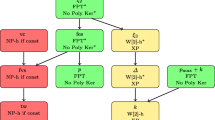Abstract
In this paper, we consider a generalization of the classical vertex coloring problem of a graph, where the edge set of the graph is partitioned into strong and weak edges; the endpoints of a weak edge can be assigned to the same color and the minimum chromatic violation problem (MCVP) asks for a coloring of the graph minimizing the number of weak edges having its endpoints assigned to the same color. Previous works in the literature on MCVP focus on defining integer programming formulations and performing polyhedral studies on the associated polytopes but, to the best of our knowledge, very few computational complexity studies exist for MCVP. In this work, we focus on the computational complexity of this problem over several graph families such as interval and unit interval graphs, among others. We show that MCVP is NP-hard for general graphs and it remains NP-hard when the graph induced by the strong edges is unit interval or distance hereditary. On the other side, we provide a polynomial algorithm that properly solves MCVP when the graph is a unit interval graph without triangles with two or more weak edges.
Access this chapter
Tax calculation will be finalised at checkout
Purchases are for personal use only
Similar content being viewed by others
References
Ahuja, R.K., Magnanti, T.L., Orlin, J.B.: Network Flows: Theory, Algorithms, and Applications. Prentice Hall, Hoboken (1993)
Biró, M., Hujter, M., Tuza, Z.S.: Precoloring extension. I. Interval graphs. Discrete Math. 100, 267–279 (1992)
Borndörfer, R., Eisenblätter, A., Grötschel, M., Martin, A.: The Orientation Model for Frequency Assignment Problems, ZIB-Berlin TR 98–01 (1998)
Bonomo, F., Durán, G., Marenco, J.: Exploring the complexity boundary between coloring and list-coloring. Ann. Oper. Res. 169, 3–16 (2009)
Bonomo-Braberman, F., Gonzalez, C.: A new approach on locally checkable problems. Discret. Appl. Math. 314, 53–80 (2022)
Braga, M., Delle Donne, D., Escalante, M.S., Marenco, J., Ugarte, M.E., Varaldo, M.C.: The minimum chromatic violation problem: a polyhedral approach. Discret. Appl. Math. 281, 69–80 (2020)
Burke, E., Marecek, J., Parkes, A., Rudová, H.: A supernodal formulation of vertex colouring with applications in course timetabling. Ann. Oper. Res. 179–1, 105–130 (2010)
Carlisle, M.C., Lloyd, E.L.: On the k-coloring of intervals. Discret. Appl. Math. 59, 225–235 (1995)
Chow, F.C., Hennessy, J.L.: The priority-based coloring approach to register allocation. ACM Trans. Program. Lang. Syst. 12–4, 501–536 (1990)
Delle Donne, D., Escalante, M.S., Ugarte, M.E.: Implementing cutting planes for the chromatic violation problem. In: Proceedings of the Joint ALIO/EURO International Conference 2021–2022 on Applied Combinatorial Optimization, OpenProceedings.org, pp. 17–22 (2022)
de Werra, D.: An introduction to timetabling. Eur. J. Oper. Res. 19, 151–162 (1985)
Edmonds, J., Karp, R.M.: Theoretical improvements in algorithmic efficiency for network flow problems. J. Assoc. Comput. Mach. 19, 248–264 (1972)
Gamst, A.: Some lower bounds for a class of frequency assignment problems. IEEE Trans. Veh. Technol. 35–1, 8–14 (1986)
Garey, M., Johnson, D.: Computers and Intractability: A Guide to the Theory of NP-Completeness (1979). Freeman, W. H
Grötschel, M., Lovász, L., Schrijver, A.: The ellipsoid method and its consequences in combinatorial optimization. Combinatorica 1, 169–197 (1981)
Leighton, F.T.: A graph coloring algorithm for large scheduling problems. J. Res. Natl. Bur. Stand. 84–6, 489–503 (1979)
Marx, D.: Precoloring extension on unit interval graphs. Discret. Appl. Math. 154, 995–1002 (2006)
Woo, T.K., Su, S.Y.W., Newman Wolfe, R.: Resource allocation in a dynamically partitionable bus network using a graph coloring algorithm. IEEE Trans. Commun. 39–12, 1794–1801 (2002)
Author information
Authors and Affiliations
Corresponding author
Editor information
Editors and Affiliations
Rights and permissions
Copyright information
© 2024 The Author(s), under exclusive license to Springer Nature Switzerland AG
About this paper
Cite this paper
Delle Donne, D., Escalante, M., Ugarte, M.E. (2024). On the Complexity of the Minimum Chromatic Violation Problem. In: Basu, A., Mahjoub, A.R., Salazar González, J.J. (eds) Combinatorial Optimization. ISCO 2024. Lecture Notes in Computer Science, vol 14594. Springer, Cham. https://doi.org/10.1007/978-3-031-60924-4_12
Download citation
DOI: https://doi.org/10.1007/978-3-031-60924-4_12
Published:
Publisher Name: Springer, Cham
Print ISBN: 978-3-031-60923-7
Online ISBN: 978-3-031-60924-4
eBook Packages: Computer ScienceComputer Science (R0)




